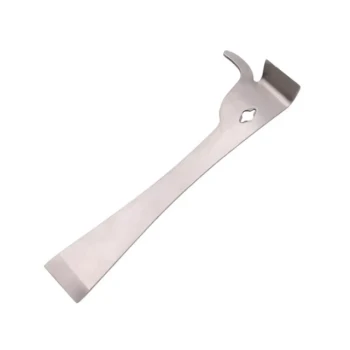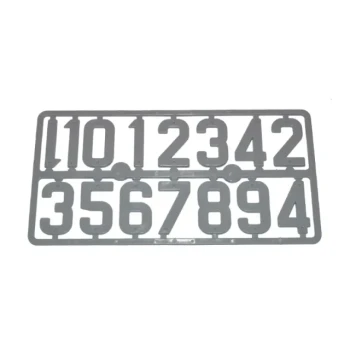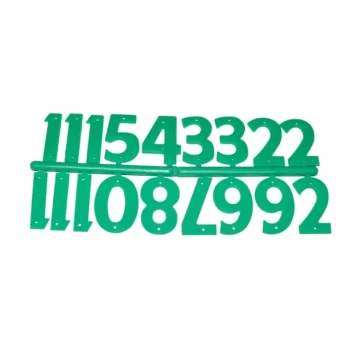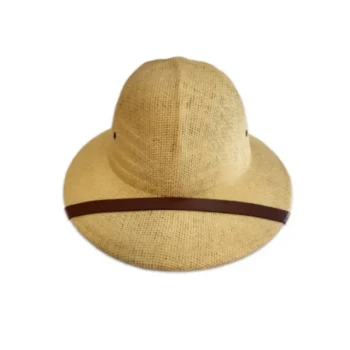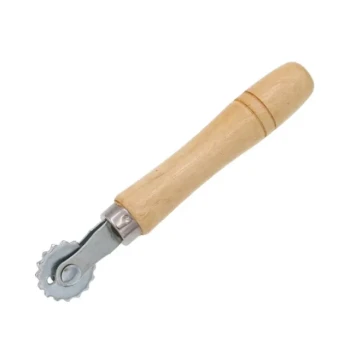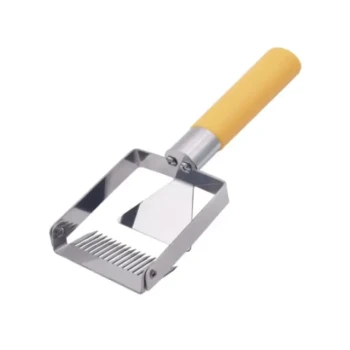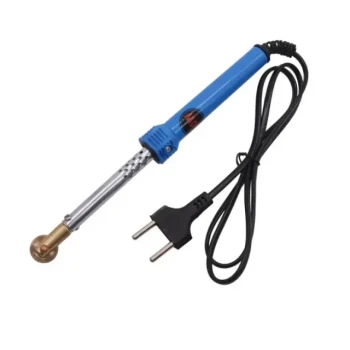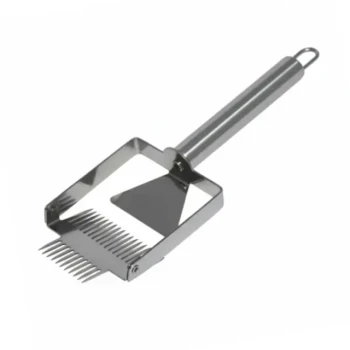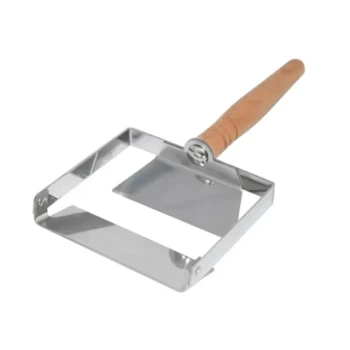At its core, queen rearing is crucial because it grants a beekeeper direct control over the genetic makeup, health, and productivity of their entire apiary. Instead of relying on chance, beekeepers can selectively breed queens from their best-performing colonies to consistently promote desirable traits like high honey production, strong disease resistance, and a calm temperament.
Relying on a randomly supplied or naturally superseded queen means accepting a genetic lottery for your hive's most critical member. Queen rearing transforms beekeeping from a reactive practice into a proactive strategy, allowing you to systematically improve your apiary for long-term health and success.
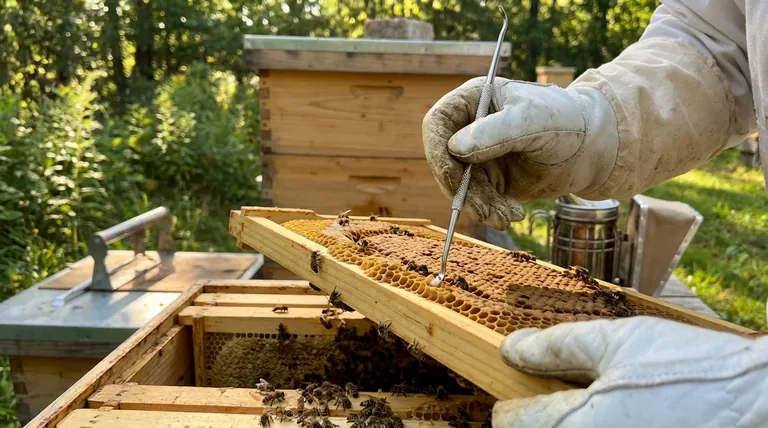
The Core Benefits of Rearing Your Own Queens
The decision to rear queens is a shift from simply managing bees to actively cultivating superior stock. This control unlocks several fundamental advantages that impact every aspect of the apiary.
Achieving Genetic Improvement
Queen rearing is essentially selective breeding for honey bees. You identify your strongest, healthiest, most productive, and calmest colony and use its genetics as the foundation for new queens. This allows you to actively select for traits that matter most to you.
Enhancing Colony Health
A vigorous, well-bred queen lays a consistent and prolific brood pattern. This results in a large population of healthy worker bees, which is the colony's primary defense against pests and diseases. By breeding from colonies that show natural resistance to issues like Varroa mites, you can build a more resilient apiary.
Increasing Honey Production
Strong genetics directly translate to productivity. A colony headed by a queen bred from high-producing stock will have a stronger foraging workforce, leading to significantly better honey yields. This is one of the most direct and tangible returns on the investment in queen rearing.
Enabling Sustainable Apiary Growth
Having a ready supply of your own queens makes it simple and cost-effective to expand your operation. You can confidently make "splits" to create new hives, knowing you have a high-quality queen ready to lead each new colony. This also provides insurance against unexpected queen loss.
The Practical Advantages in Apiary Management
Beyond the genetic benefits, the practice of rearing queens streamlines the day-to-day work of the beekeeper, saving both time and money.
Reducing Costs and Dependency
Purchasing queens can be expensive, especially if you need to requeen multiple hives or expand your apiary. Rearing your own is far more cost-effective at any scale beyond a few hives. It also frees you from dependence on queen suppliers, whose availability and quality can be unpredictable.
Improving Hive Inspections
When you rear your own queen, you can mark her before introducing her to the hive. A marked queen is incredibly easy to spot during inspections, saving a significant amount of time. This simple practice also allows you to quickly confirm her presence and assess if the colony is preparing to swarm or has already replaced her.
Understanding the Trade-offs
While immensely beneficial, queen rearing is a skill that requires a realistic understanding of the commitment involved. It is not a passive activity.
The Required Learning Curve
Successfully rearing queens requires specific knowledge and techniques, such as grafting larvae and managing cell-builder colonies. It demands careful attention to timing and detail, representing a step up in beekeeping expertise.
The Investment of Time and Equipment
The process requires dedicated time during the busiest part of the beekeeping season. It also involves some specialized but relatively inexpensive equipment, such as grafting tools and mating nucs (small starter hives).
The Inherent Risks
Not every attempt will be successful. Factors outside your control, such as poor weather during mating flights or the colony rejecting the new queen, can lead to failure. This is a natural and expected part of the process.
Making the Right Choice for Your Goal
The decision to rear your own queens should align directly with your objectives as a beekeeper.
- If your primary focus is a profitable, commercial operation: Queen rearing is a non-negotiable skill for controlling costs, ensuring a supply for expansion, and maximizing honey yields.
- If your primary focus is sustainable, self-sufficient beekeeping: This practice is the key to creating a resilient apiary that is perfectly adapted to your local environment and independent of outside suppliers.
- If your primary focus is the hobby itself: Learning to rear queens is a deeply rewarding challenge that gives you calmer, more productive bees and greater insight into the life of the colony.
Ultimately, queen rearing empowers you to move from simply keeping bees to actively shaping the genetic destiny of your apiary.
Summary Table:
| Benefit | Key Outcome |
|---|---|
| Genetic Improvement | Select for traits like high honey production, disease resistance, and calm temperament. |
| Enhanced Colony Health | Build resilient hives with natural resistance to pests like Varroa mites. |
| Increased Honey Production | Stronger foraging workforce leads to significantly better honey yields. |
| Sustainable Growth | Cost-effective splits and expansion with a ready supply of quality queens. |
| Cost Reduction | Eliminate dependency on expensive, unpredictable queen suppliers. |
Ready to take control of your apiary's future?
At HONESTBEE, we supply the high-quality beekeeping supplies and equipment that commercial apiaries and distributors need to succeed in queen rearing and beyond. From grafting tools to mating nucs, our wholesale-focused operations ensure you have the reliable gear to breed superior, productive colonies.
Contact our expert team today to discuss how our products can support your genetic improvement goals and boost your operation's profitability and resilience.
Visual Guide
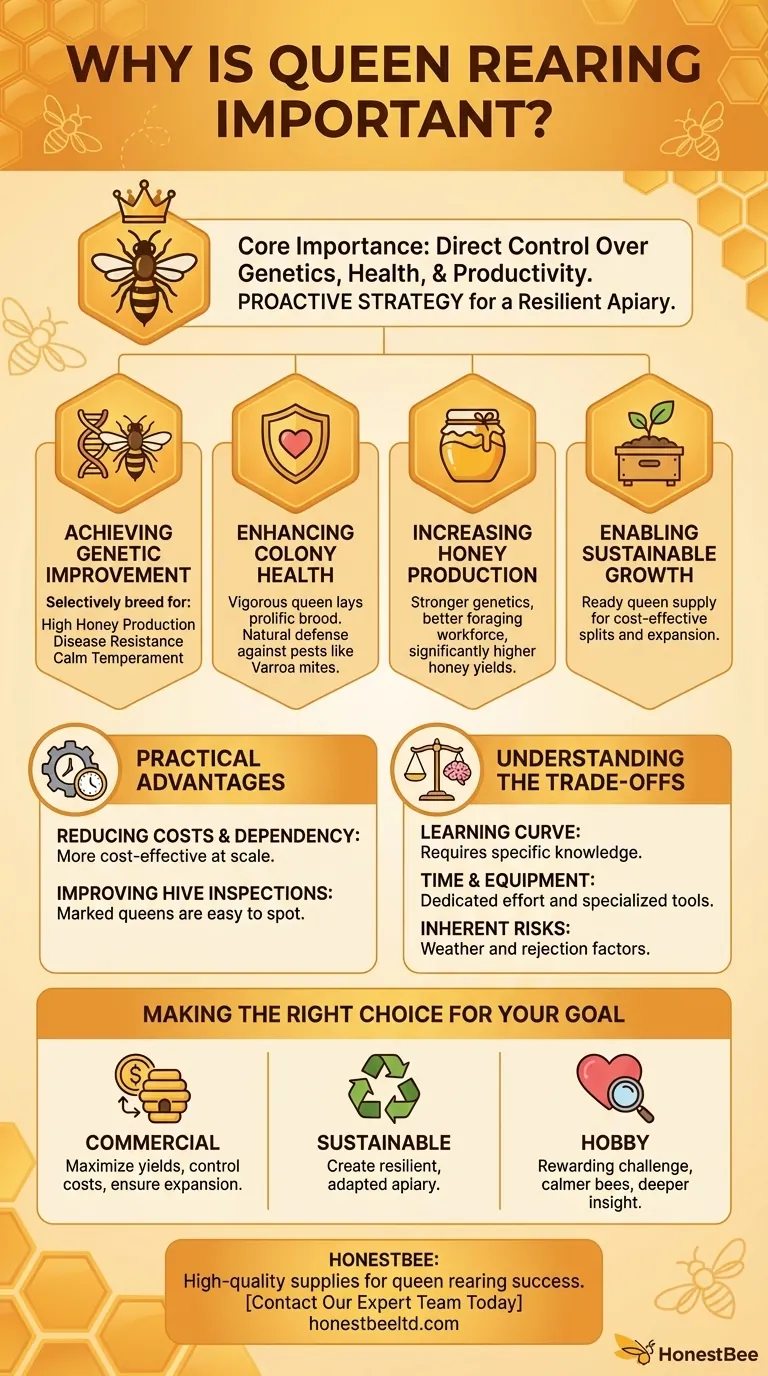
Related Products
- Double Head Beekeeping Grafting Tools for Beekeepers
- Plastic Queen Bee Catcher Marker Tube Holder for Queen Marking Bottle
- Professional Multi-Function Stainless Steel Hive Tool
- Wholesales Dadant Size Wooden Bee Hives for Beekeeping
- Professional Insulated Plastic Bee Hives
People Also Ask
- What are the primary indicators evaluated using high-precision electronic scales during the honey bee queen breeding process?
- What is the role of a high-precision electronic scale in evaluating the development quality of a queen bee?
- What role does a biological laboratory incubator play in honey bee queen development? Secure Your High-Value Queens
- Why is a high-precision pH meter used in queen rearing? Optimize Larval Acceptance with Data
- How do queen rearing equipment and related consumables optimize the genetic productivity? Boost Apiary Efficiency
- How does Professional Queen Bee Rearing Equipment improve apiary productivity? Master Genetic Success
- What role do starter colonies play in queen rearing? Boost Larval Nutrition and Queen Quality
- How do saturated salt solution containers regulate humidity in honeybee incubators? Achieve Stable 75% RH Easily


